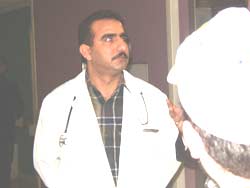|
Peace Team Details | Reports | Messages to
Human Cost of War on Iraq
31 January 2003
IRAQ
 Bleary eyed as a result of our late night arrival in Baghdad after a 13 hour
drive from Amman, the honking of Baghdad traffic woke us up early. It was
just as well with both a breakfast meeting and a press conference on the
morning agenda.
Bleary eyed as a result of our late night arrival in Baghdad after a 13 hour
drive from Amman, the honking of Baghdad traffic woke us up early. It was
just as well with both a breakfast meeting and a press conference on the
morning agenda.
As we enjoyed a simple breakfast of olives, shoeleather bread, yogurt and
cheese we received a quick review of the day's plans, a brief orientation
and some details of the press conference scheduled for later that morning,
organized by the New York-based Center for Economic and Social Rights (to
read the report see www.cesr.org).
The purpose of the press conference was to release a report highlighting the
human costs of a war against Iraq. The report, entitled "The Humanitarian
and Legal Implications of War Against Iraq" represents "the first credible
scientific report to demonstrate that current U.S. war planning will violate
binding international laws meant to protect civilians during conflict,"
according to executive director of CESR, Roger Normand - in other words, war
crimes.
The report describes the Pentagon's plan to target Iraq's national
electricity grid with their initial strikes. The resulting damage to water,
sanitation, public health and food distribution systems and consequent
spread of diseases will claim enormous numbers of civilian casualties - in a
confidential U.N. document, up to 500 000 Iraqis. CESR argues that such
disproportionate 'collateral damage' constitutes a violation of
international law. This comes at a time when Iraq is already weakened as a
result of 12 years of economic sanctions.
At first glance, Baghdad appears to have stubbornly defied years of war and
sanctions. In the streets, hawkers vend supplies, food, and other items
while shops abound with food and consumer items. Electricity seems to be
reliable and although tap water has been rendered undrinkable as a result of
the Gulf War bombing campaigns and sanctions, bottled water is widely
available. People go about their daily lives as they do elsewhere. Wedding
music blares from the Palestine Hotel across the street.
Appearances can, however, be deceiving. Speaking to hotel staff where we
are staying we hear many stories. Staff person Laith tells me that while
basic needs seem to be available the truth is that for many Iraqis, the
costs of items are often prohibitive. For poor Iraqis access to bottled
water and adequate food are not a daily reality. According to the CESR
report, 60 per cent of Iraqis are dependent upon government-provided food
rations, which lie only marginally above minimal international standards.
UNICEF calls the likely war time collapse of this fragile food distribution
system a "nightmare scenario."
The destruction of the electricity grid will cripple this system as well as
the other essential infrastructure - water treatment and sanitation.
Already with the system functioning as it is before a major escalation of
war malnutrition rates and water-borne diseases are dramatically affecting
many Iraqi people. A war-induced spike in water-borne disease and child
mortality will decimate an entire generation of Iraqi children.
In the tour following the press conference we visit the leukemia ward of the
Al Mansour Teaching Hospital. In a room filled with microphone and camera
toting media personnel, I drift to the quiet side of the room where I
observe a thin, young boy and his mother. I greet him with a sad smile. My
fellow Iraq Peace Team member, Bret, removes a pen and paper and gently
hands it over to 8 year old Hassan. With a beaming smile he starts to draw,
glancing at his mother and then at us for encouragement. It is a touching
moment in a sterile hospital environment.
On the other side of the room the Iraqi doctor who is leading the tour tells
us that the hospital is managing as best as it can with the shortages of
medicines, supplies and equipment and the looming threat of a U.S. led
attack. A tear wells up in my eyes at the thought of what will happen to
Hassan and many others like him should the Bush administration push ahead
with its agenda.
Minutes later, as we're wrapping up the tour, we run into Hans von Sponeck,
a 32 year veteran of the United Nations and former U.N. Humanitarian
Coordinator for Iraq until he resigned in February 2000 in protest of
Security Council policy towards Iraq. I remember his comments earlier that
morning at the press conference: "War against the people of Iraq is also a
war against the U.N. and a war against international law," and that "the
U.N. will not endorse a war on Iraq, meaning that the U.S. will be forced to
act unilaterally." He suggested that we need to dismantle the wall of
disinformation being conveyed by the U.S. and challenged all to hold the
U.S. government accountable for their action. That was a strong call to
action.
For Hassan and the countless other lives that might be lost, I pledge to
continue to do just that.
|